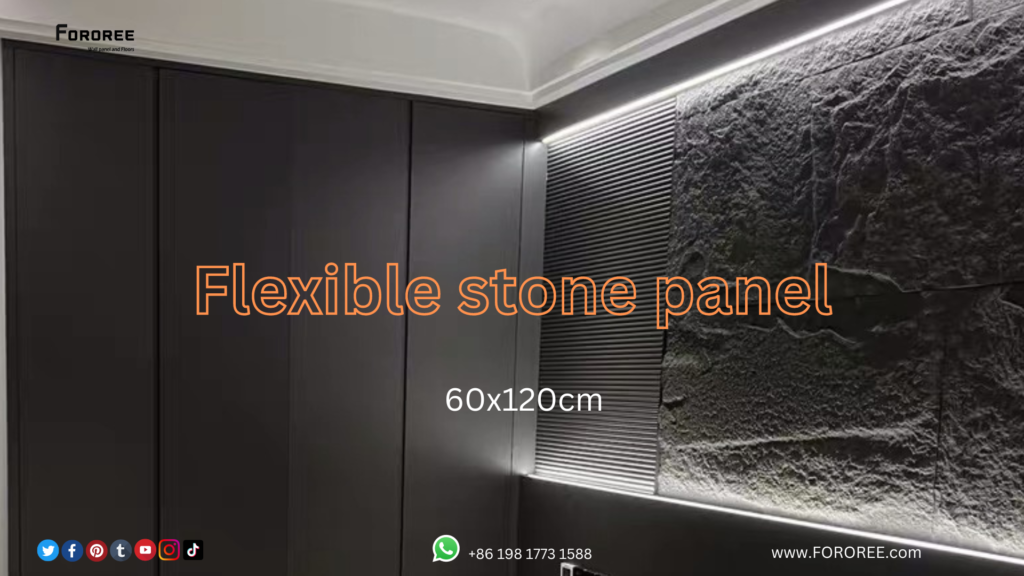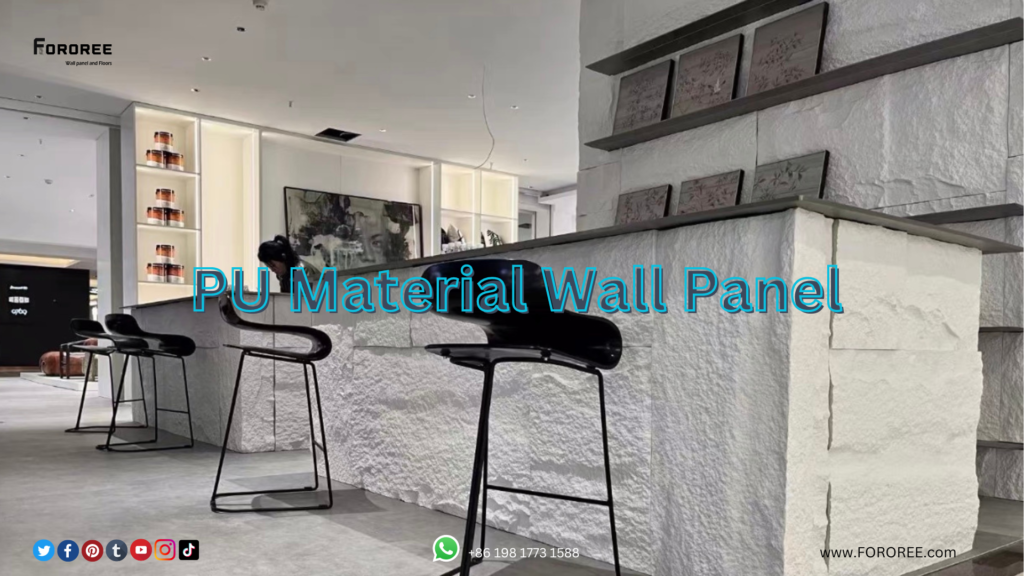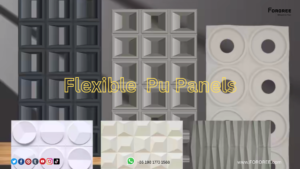China PU stone manufacturer. Flexible PU (Polyurethane) wall panels are a type of decorative wall covering that offers versatility in design and installation. Here’s an overview of flexible PU wall panels:
- Material: PU wall panels are made from polyurethane, a durable and flexible material. Polyurethane is known for its resistance to wear, tear, and impact, making it suitable for wall applications.
- Flexibility: One of the key features of PU wall panels is their flexibility. They can be easily bent, curved, or shaped to fit irregular surfaces, corners, or architectural features. This flexibility allows for creative and customized designs.
- Design Options: PU wall panels come in a wide range of designs, patterns, and textures, including faux stone, brick, wood, tile, or contemporary geometric patterns. They can mimic the look and feel of various materials while offering the benefits of polyurethane.
- Installation: PU wall panels are typically lightweight and easy to install. They can be adhered directly to the wall surface using construction adhesive or installed using a tongue-and-groove system. Some panels may also feature interlocking edges for seamless installation.
- Durability: PU wall panels are durable and long-lasting, resistant to moisture, mold, mildew, and insect damage. They are easy to clean and maintain, requiring only occasional dusting or wiping with a damp cloth.
- Insulation: Polyurethane has inherent insulating properties, which can help improve the thermal and acoustic performance of the walls. PU wall panels can contribute to energy efficiency by providing additional insulation against heat loss or sound transmission.
- Versatility: PU wall panels are suitable for various applications, including residential, commercial, and hospitality settings. They can be used to create accent walls, feature panels, wainscoting, or decorative elements in interior spaces.
- Cost: The cost of flexible PU wall panels can vary depending on factors such as the design, size, thickness, and brand. While PU panels may have a higher upfront cost compared to some other wall covering options, they offer long-term value due to their durability and low maintenance requirements.
Overall, flexible PU wall panels are a versatile and stylish option for enhancing interior spaces with decorative wall coverings. They offer flexibility in design, ease of installation, durability, and insulation properties, making them suitable for a wide range of applications.

PU material panel
Polyurethane (PU) material panels are commonly used in construction, interior design, and furniture manufacturing due to their versatility, durability, and aesthetic appeal. PU panels can come in various forms, including:
- PU Foam Panels: These panels are lightweight and have excellent insulation properties, making them suitable for applications such as wall insulation, soundproofing, and ceiling tiles. PU foam panels can be rigid or flexible, depending on the specific requirements of the project.
- PU Decorative Panels: PU decorative panels often mimic the look and texture of natural materials such as wood, stone, or brick. These panels can be used to enhance the visual appeal of interior spaces, such as walls, ceilings, or furniture, without the cost and maintenance associated with natural materials.
- PU Sandwich Panels: PU sandwich panels consist of a rigid PU foam core sandwiched between two facing materials, such as metal, aluminum, or fiberglass sheets. These panels are commonly used in building facades, roofing, and insulated doors due to their lightweight, strength, and thermal insulation properties.
- PU Structural Panels: PU structural panels are engineered to provide structural support while also offering insulation and weatherproofing properties. These panels are used in applications such as prefabricated building construction, cold storage facilities, and transportation vehicles.
- PU Wall Panels: PU wall panels are designed to provide both insulation and aesthetic enhancement for interior walls. They can come in various styles, textures, and colors, allowing for creative design possibilities in residential, commercial, and industrial settings.
- PU Ceiling Panels: PU ceiling panels are lightweight and easy to install, making them ideal for covering large ceiling areas in both residential and commercial buildings. They can provide thermal insulation, sound absorption, and decorative features to enhance indoor environments.
Overall, PU material panels offer a wide range of benefits, including thermal insulation, soundproofing, durability, and design flexibility. They are a popular choice for architects, designers, and homeowners looking for cost-effective and sustainable building solutions.
What are the advantages of PU wall panels ?
PU (Polyurethane) wall panels offer several advantages that make them a popular choice for interior wall applications:
- Insulation: PU wall panels provide thermal insulation, helping to regulate indoor temperatures and reduce energy costs. The insulating properties of PU help keep spaces warmer in winter and cooler in summer, improving overall comfort levels.
- Soundproofing: PU wall panels have excellent sound absorption qualities, reducing noise transmission between rooms and improving acoustics within a space. This makes them ideal for use in residential, commercial, and industrial settings where noise control is important.
- Durability: PU wall panels are durable and long-lasting, resisting wear, tear, and damage from impacts. They are also resistant to moisture, mold, and mildew, making them suitable for use in humid environments such as bathrooms and kitchens.
- Easy Installation: PU wall panels are lightweight and easy to install, requiring minimal tools and expertise. They can be installed directly onto existing walls or substrates using adhesive or mechanical fasteners, saving time and labor costs.
- Versatility: PU wall panels come in a wide range of styles, textures, and finishes, allowing for creative design possibilities. They can mimic the look of natural materials such as wood, stone, or brick, providing a high-end aesthetic without the cost and maintenance associated with real materials.
- Low Maintenance: PU wall panels are easy to clean and maintain, requiring only occasional dusting or wiping with a damp cloth to remove dirt and stains. They do not require painting, staining, or sealing like traditional wall materials, saving time and effort in upkeep.
- Environmental Friendliness: Some PU wall panels are made from recycled materials or are recyclable themselves, reducing their environmental impact. Additionally, the energy-saving properties of PU insulation contribute to sustainability by reducing energy consumption in buildings.
Overall, PU wall panels offer a combination of insulation, soundproofing, durability, ease of installation, and design versatility, making them an attractive option for enhancing interior spaces in residential, commercial, and industrial buildings.

Simulation stone PU
Simulation stone PU refers to polyurethane (PU) panels designed to mimic the appearance of natural stone. These panels offer several advantages over traditional stone materials while providing a similar aesthetic:
- Appearance: Simulation stone PU panels closely resemble the texture, color, and pattern of natural stone, offering a realistic and high-end appearance. They can replicate various types of stone, including marble, granite, limestone, slate, and travertine.
- Versatility: PU panels are lightweight and flexible, allowing for easy installation on walls, ceilings, and other surfaces. They can be cut, shaped, and molded to fit specific design requirements, providing flexibility in application.
- Cost-effective: Simulation stone PU panels are generally more affordable than natural stone, making them a cost-effective alternative for achieving the look of stone without the expense. They also eliminate the need for expensive installation techniques and equipment required for handling heavy stone materials.
- Durability: PU panels are durable and resistant to moisture, mold, mildew, and impact damage. Unlike natural stone, they do not require sealing or special maintenance treatments to preserve their appearance, making them easier to maintain over time.
- Insulation: PU panels offer thermal and acoustic insulation properties, helping to improve energy efficiency and soundproofing in interior spaces. This can contribute to a more comfortable and efficient living or working environment.
- Environmental Friendliness: Some simulation stone PU panels are made from recycled materials or are recyclable themselves, reducing their environmental impact compared to natural stone. Additionally, the lightweight nature of PU panels can reduce transportation emissions and energy consumption during installation.
Thus,simulation stone PU panels provide an attractive and practical solution for interior design projects seeking the look and feel of natural stone without the associated costs and maintenance requirements. They offer versatility, durability, and environmental benefits, making them a popular choice for residential, commercial, and hospitality applications.




